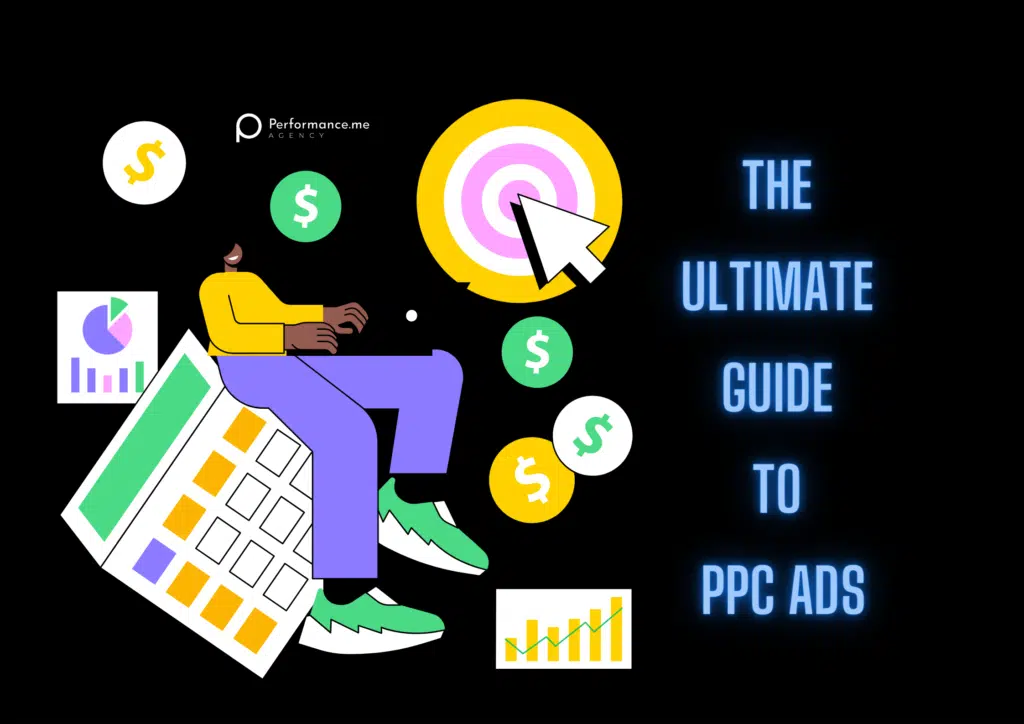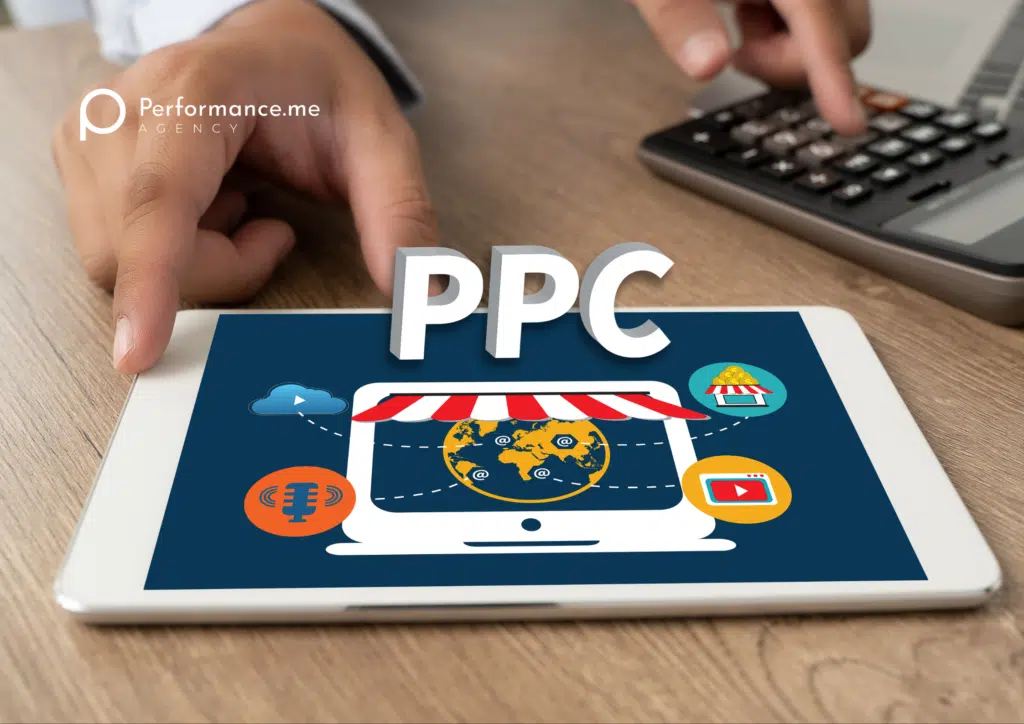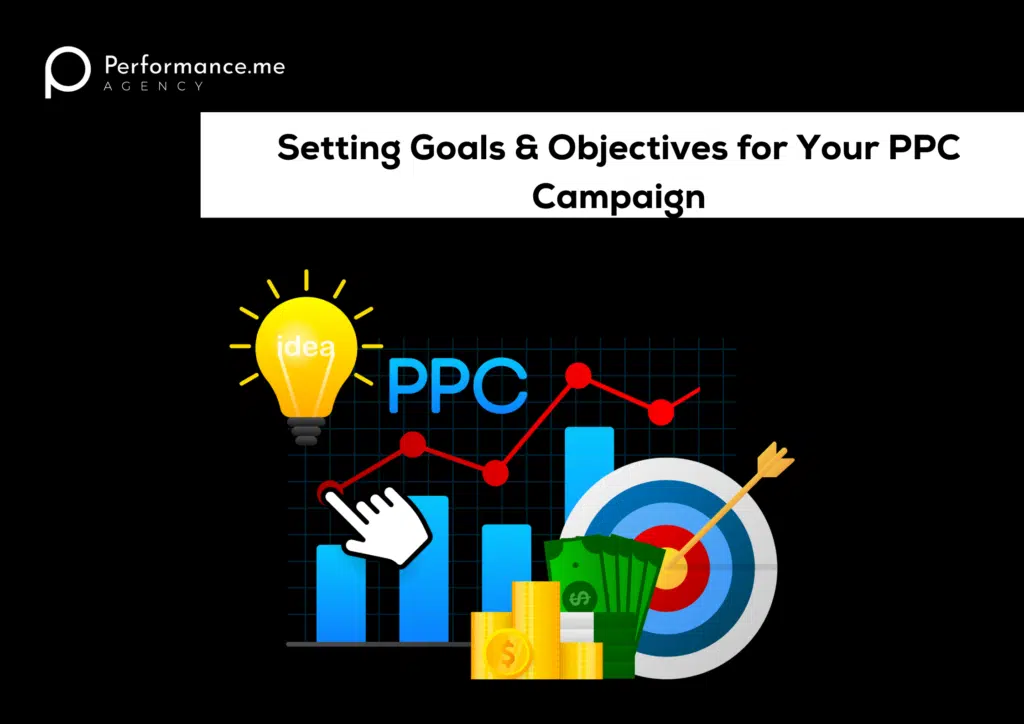Perhaps you’re searching for ways to get your first traffic and sales for a new business, or you’re thinking about expanding your brand’s online presence. PPC is a digital marketing channel in which businesses drive search engine traffic and configurations.
Typically, PPC Ads can be a great way to market your company and attract more customers, but it can be quite complicated at first for those new to the channel. This blog will explain what PPC Ads are, how they work, how you can use them to drive success for your business, and how multiple platforms work.
What Exactly Is PPC?
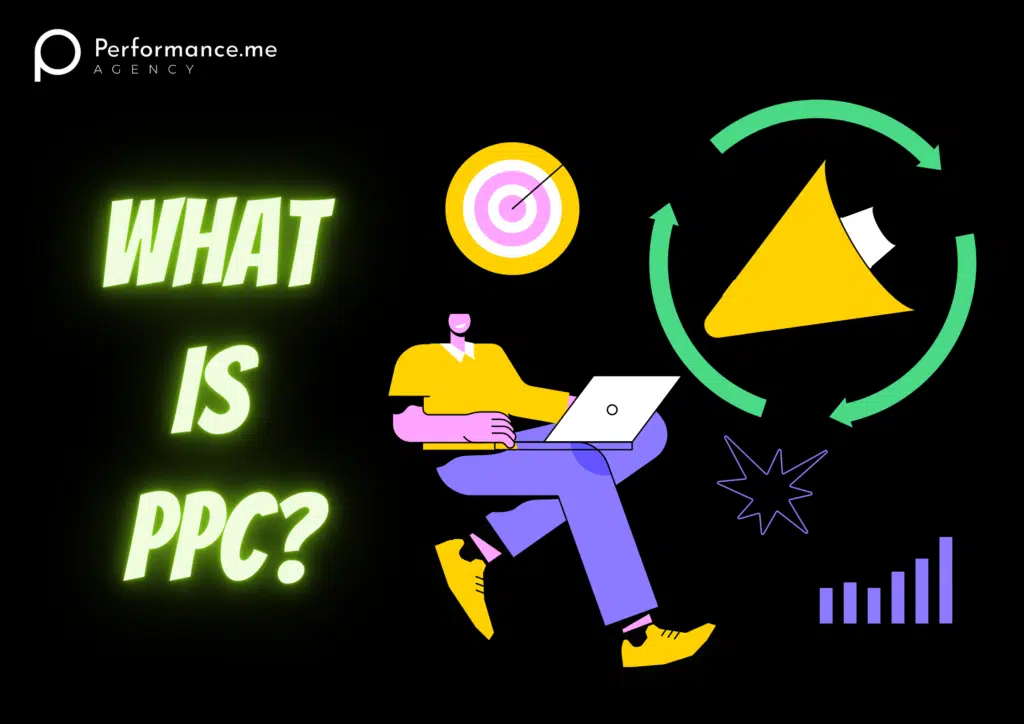
PPC stands for pay-per-click, an online marketing framework in which advertising agencies pay a fee each time one of their ads is clicked. It is a method of paying for visits to your webpage rather than trying to “earn” those visits through an organic search.
The search engine method of advertising is one of the most common forms of PPC. It enables advertisers to bid on advertising strategy in a search engine’s sponsored ads. The ad pops up when a client searches for a keyword that is related to their business offering.
For example, if we bid on the keyword “PPC software”, our ad may appear near the top of the results when users type “PPC software”.
What Is the Process of Pay-Per-Click Advertising (PPC Ads)?
PPC as a marketing channel encompasses a variety of advertising platforms, the most popular of which are Google Ads and Bing Ads. And there are various ad formats available on each of these platforms.
Most businesses begin their PPC advertisements with Google ads. This is because it provides access to a massive audience of would-be clients and customers. It also offers a range of different forms to set up and run advertisements depending on your objectives.
However, regardless of platform or ad layout, the way PPC works is relatively unchanged, and it is a fairly straightforward process:
- Sign up for a platform marketing account.
- Make advertisements (and select the proper targeting by adding keywords or audiences, etc.).
- Set the highest price you’re willing to pay for each click.
- Your advert is placed in an auction with other advertisers making a bid on the exact keywords.
- The order in which the ads appear is determined by auction.
- Whenever anyone clicks on your ad, you pay.
It is quite simple and easy to grasp. Although there are differences between different ad formats (and other bidding strategies that can be used, for example), the basic principles remain the same.
But first, let’s look at why you should use PPC and how they work before discussing the different PPC platforms.
Why Should You Use PPC?
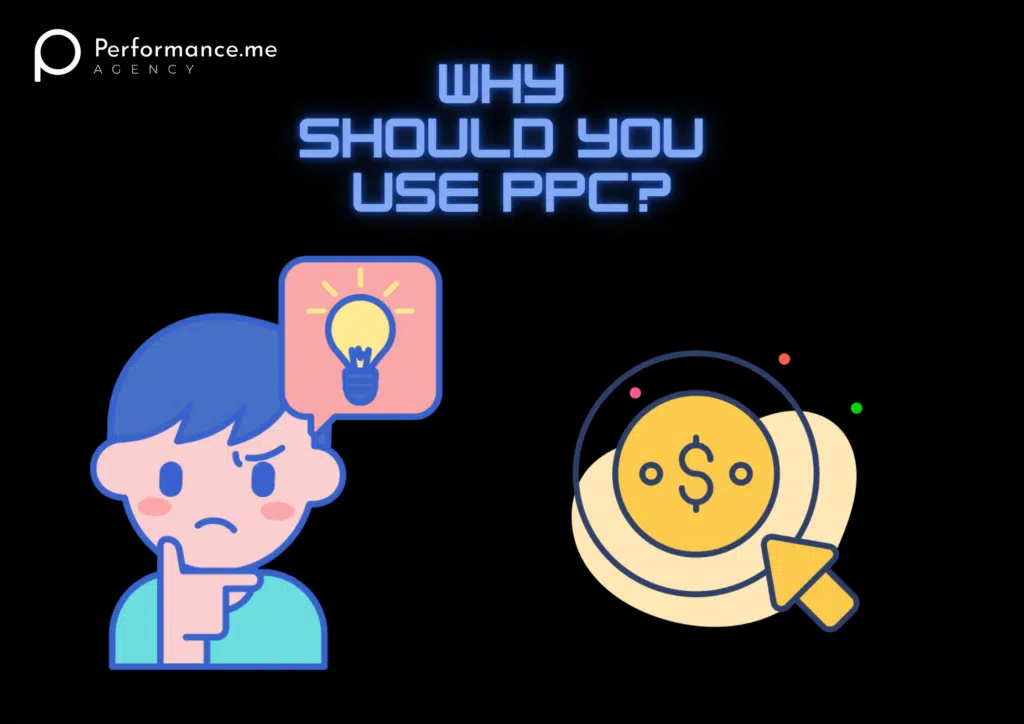
The importance of PPC is based on a company’s ability to accurately read data, make changes to ad campaigns, wait for new data, and then measure the effectiveness of their differences.
This field of advertising is exceptionally data-rich, providing marketers with highly granular data and ad control. Because these changes can result in significant budget savings and even higher ROI, they are a big part of why PPC is so important in modern marketing. Businesses can use PPC to do the following:
- Maximize clicks based on the ad budget you’ve set.
- Set a specific cost-per-action (CPA) goal for targeted marketing styles like product sales, signups, app downloads, etc.
- Target a particular return-on-ad-spend amount (target ROAS); in other words, a particular balance of spend and income.
- Maximize conversion (in cases where businesses are willing to spend more money).
- Increase the value of conversions (for ads that are set up for high-value keywords).
- For ad spaces, aim for the lowest bids.
- Set daily cost budgets as well as overall total budgets.
How Do Keywords Work in PPC Digital Marketing?
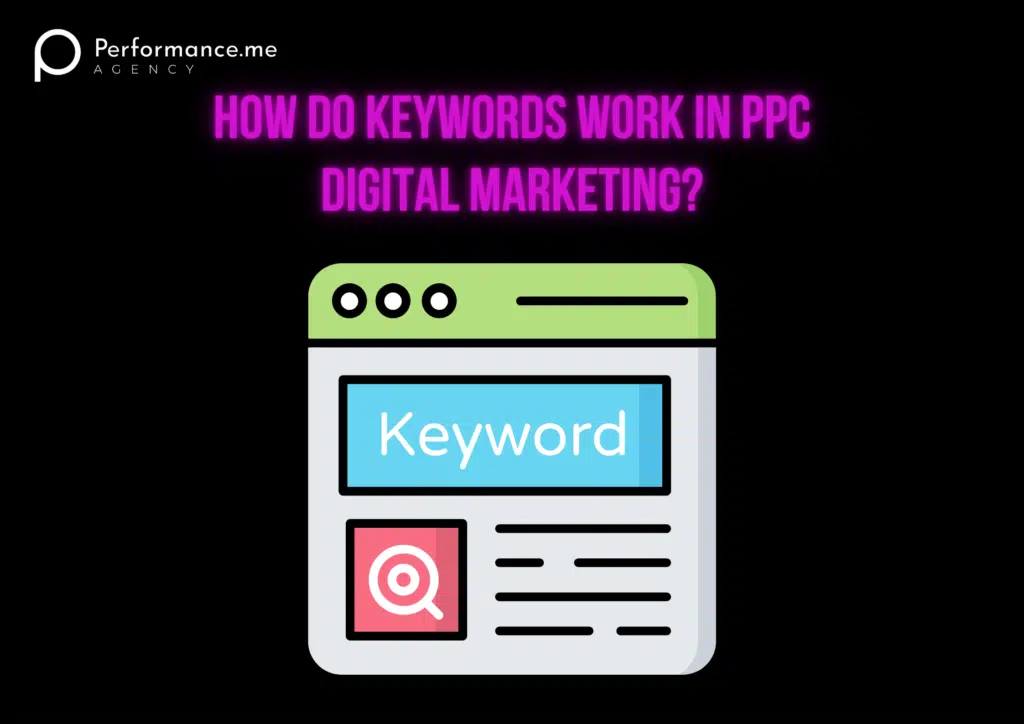
In PPC Marketing, the ad auction bidding system is used. Marketers must bid on the keywords for which they want their ads to trigger or exhibit.
If a user wishes to purchase a new item, they may use a search engine function to locate retailers who sell these items. When a client submits a search query, the search engine performs the sophisticated algorithmic calculations that underpin the Ad Auction. This involves determining which advertisements are shown, in what order, and by whom.
Because you must pay for each click on your ads, it is critical that you only make an offer on keywords relevant to your customers to ensure that your ad spend yields a return on investment. A keyword tool can assist you in locating the best keywords to bid on that are both likely to yield sales or conversions and are not incredibly expensive.
The Fundamentals of Shopping Ad Campaigns
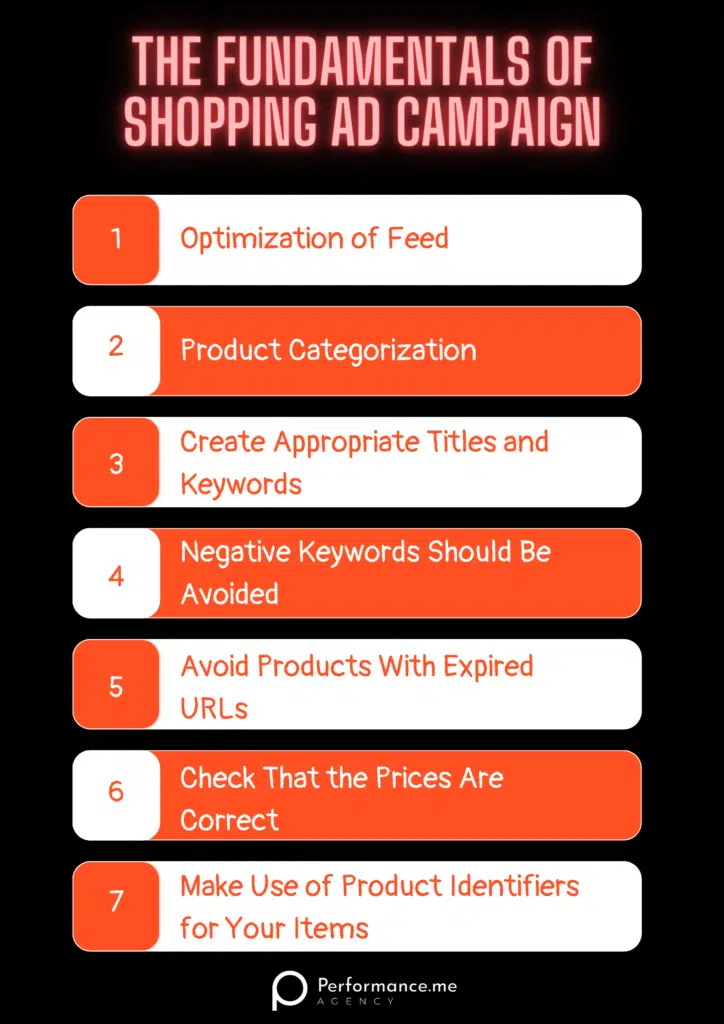
When it comes to implementing shopping ad campaigns, there are seven fundamental rules that you are required to follow. They are:
- Optimization of Feed
- Product Categorization
- Create Appropriate Titles and Keywords
- Negative Keywords Should Be Avoided
- Avoid Products With Expired URLs
- Check That the Prices Are Correct
- Make Use of Product Identifiers for Your Items
1. Optimization of Feed
The most important part of shopping ad campaigns is feed optimization. A feed contains vital product information that will assist Google in better understanding your product. More information on Feed Optimization can be found here.
Like other ad campaigns, shopping ad campaigns necessitate a lot of precise decisions. When you begin running shopping ads, you will notice a significant increase in eCommerce sales.
2. Product Categorization
All of the merchandise in your product ad groups must be classified according to the required price and profit net margin. There are other various methods you can use, such as product type, search terms, and keywords used for the products.
3. Create Appropriate Titles and Keywords
The first and most crucial step is to create appropriate product titles that include relevant keywords. Avoid using the exact keywords or product descriptions more than once. Also, make sure that each product’s title and description are unique.
4. Negative Keywords Should Be Avoided
Be highly vigilant when adding negative keywords to avoid unwanted traffic to your website or online marketplace. But also make sure you are not scrubbing out prospective keywords and keyword phrases.
5. Avoid Products With Expired URLs
Make sure that all target URLs are rerouted to live pages. Google does not display products with broken links. This lowers your ad score as well.
6. Check That the Prices Are Correct
If you are involved in international exchange rates, make sure your product prices are correct; anything other than that, Google will not display your products.
7. Make Use of Product Identifiers for Your Items
If you have merchandise that can have a GTIN or an MPN, make sure you offer it for each one. This raises your AD score as well as your exposure.
The Most Important PPC Platforms For PPC Ads
Google Ads and Facebook Ads are the most well-known PPC ads networks, accounting for 60% of the paid ads market revenue. But did you know that there are a plethora of other advertising platforms to choose from? Listed below are some of the most important PPC ads platforms.
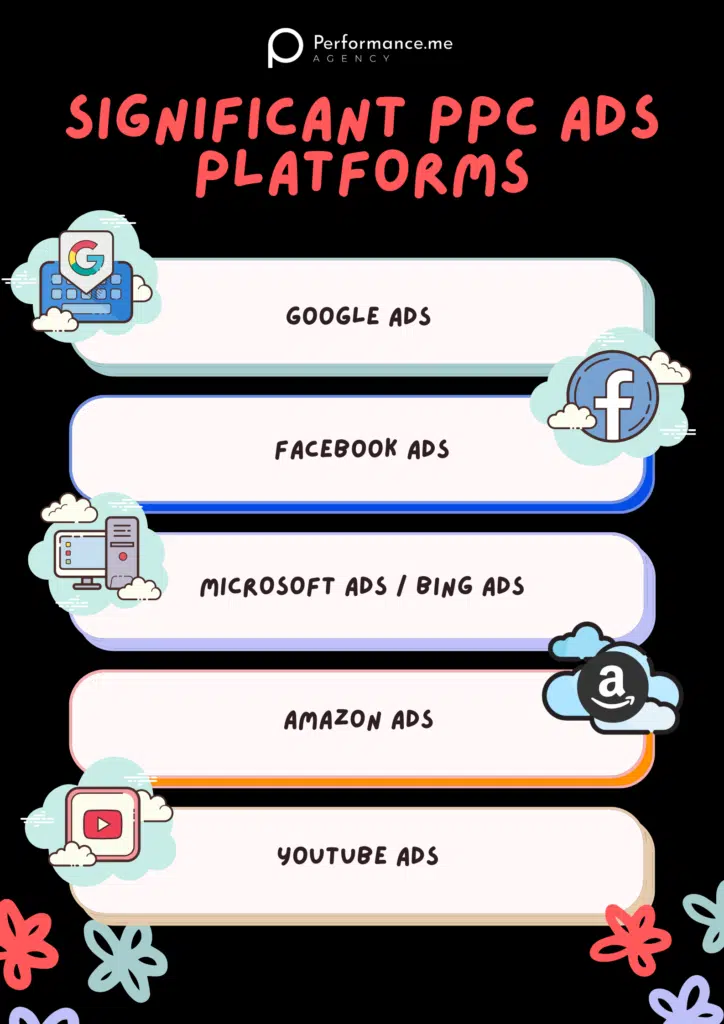
Google Ads
Google Ads, previously referred to as Google AdWords, is an ad platform that allows users to access Google search, shopping ads, YouTube video ads, Gmail ads, and display ads on the Google Display Network (GDN). It is perhaps the most prevalent PPC platform, and it provides a myriad of opportunities for almost any business to drive success through the channel.
Facebook Ads
Facebook arguably is the most popular social media site on the planet. As a result, it’s also the most popular site for social ads. Facebook currently has 22% of the digital ad having spent a share of the market, second only to Google.
Microsoft Marketing (Bing Ads)
Bing Ads, also referred to as Microsoft Advertising, works similarly to Google Ads in that it allows you to run ads on Bing as well as Yahoo and AOL. The two platforms are pretty identical in management; the main difference is the market size and potential reach.
As of 2020, Google’s market share in the United States is estimated to be 87.71 %, Bing’s 6.99 %, and Yahoo’s 3.44%. On the other hand, Bing Ads can still drive traffic and conversions, and the rate of return is frequently cited as somehow being better than Google Ads, although at a lower volume.
Amazon Ads
Amazon isn’t just an e-commerce platform in the United States, with 44% of the market share, but it is also progressively being used as a search engine. Many customers bypass all search engine results and go directly to Amazon to find what they’re looking for.
Amazon is a rising star in the PPC ads market. Their ads function similarly to Google’s in that they are centered on keywords but also include product categories. They boasted $10.1 billion in revenue for the “other” class last year, which primarily consists of advertising services revenues.
YouTube Ads
Did you know that YouTube reaches over 2 billion logged-in users per month globally? Thus, YouTube is a platform that give you an excellent opportunity to reach your audience effectively.
Campaign creation and management are handled through the Google Ads platform with more in-depth information about the audience’s demographics and engagement through YouTube Analytics in the YouTube account.
Frequently Asked Questions
What is PPC?
PPC stands for pay-per-click, an online marketing framework in which advertising agencies pay a fee each time one of their ads is clicked. It is a method of paying for visits to your webpage rather than trying to "earn" those visits through an organic search. Thus, PPC Ads prove to be really effective for online businesses.
What are the most important PPC platforms?
1. Google Ads
2. Microsoft Marketing (Bing Ads)
3. Amazon ads
4. Facebook ads
5. YouTube
What is the process of pay-per-click advertising (PPC Ads)?
1. Sign up for a platform marketing account.
2. Make advertisements (and select the proper targeting by adding keywords or audiences, etc.).
3. Set the highest price you're willing to pay for each click.
4. Your advert is placed in an auction with other advertisers making a bid on the exact keywords.
5. The order in which the ads appear is determined by auction.
6. Whenever anyone clicks on your ad, you pay.
Where Can You Learn More About PPC and Campaign Optimization?
PPC advertising (PPC Ads) can and should be a profitable marketing channel for your company. It offers many advantages that other platforms do not, and it is relatively simple to get started on the most popular platforms. It requires time to thoroughly understand and comprehend all facets of PPC and learn how to build and utilize a profitable marketing strategy.
Still, there are many excellent guides and tools available to assist you. Spend some time learning how to properly unveil and optimize a marketing strategy, as well as how to set specific goals and measure performance, and you’ll be enjoying increased traffic and conversions in no time. Want to know more? Visit our blogs! Interested in our service? Feel free to contact us. We are more than happy to help!

